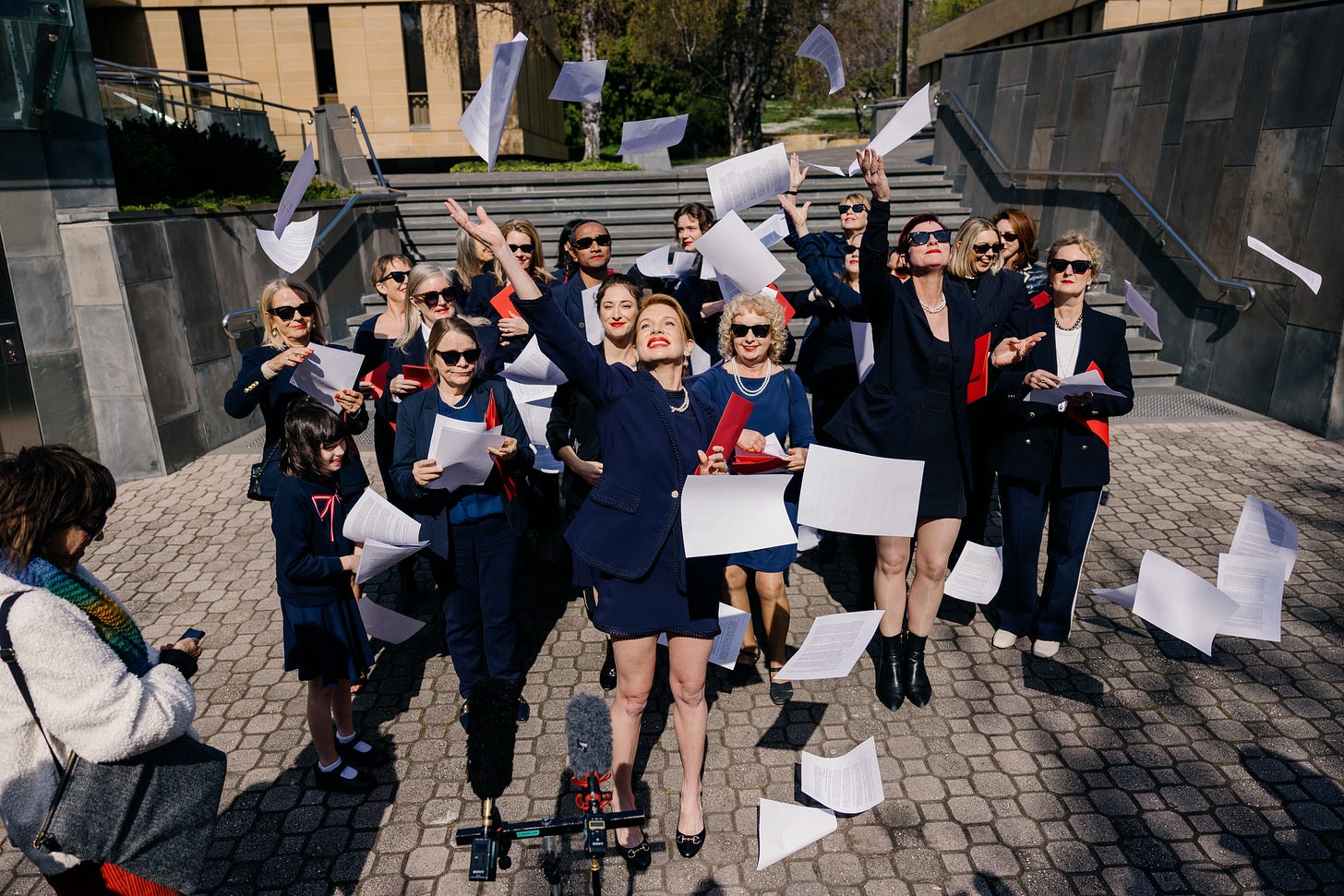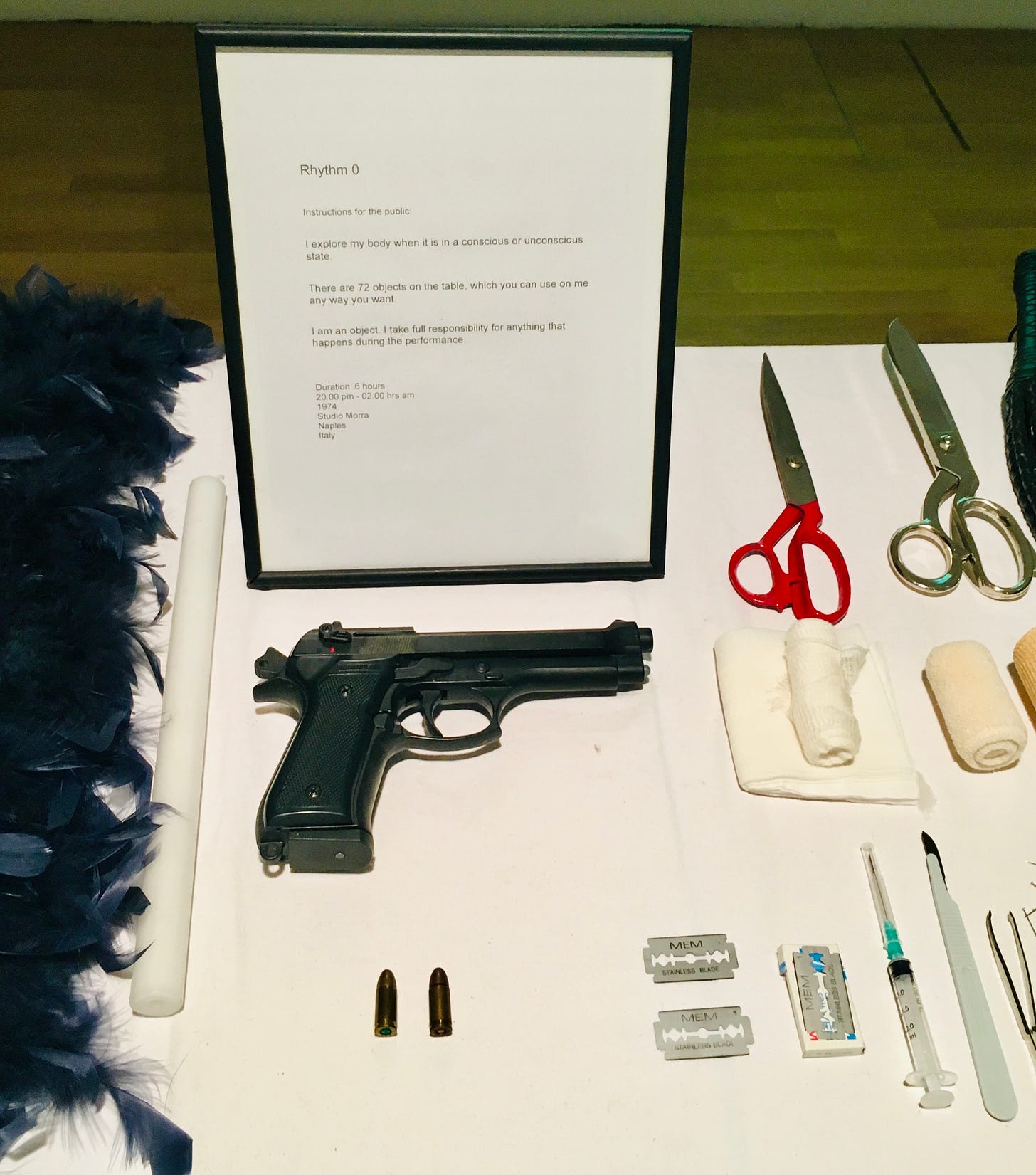The bird-flipped universe
Tasmania's Supreme Court overturns ruling that MONA's Ladies Lounge is unlawful

Last Friday, Acting Justice Shane Marshall of the Supreme Court of Tasmania delivered his judgement in Morilla Estate Pty Ltd v Lau [2024] TASSC 49. The case was an appeal brought by the Museum of Modern Art (MONA) in Tasmania, against a ruling made in April this year by Deputy President Richard Grueber of the Tasmanian Civil and Administrative Tribunal (TASCAT). Responding to a complaint made by New South Wales man Jason Lau, he had ruled that the Ladies Lounge artwork – curated by artist Kirsha Kaechele and open at MONA since 2020, attracting an estimated 425,000 visitors – was unlawful under Tasmania’s anti-discrimination legislation, because it only allowed admission to ‘ladies’ and people who identify as such. In Deputy President Grueber’s view, the deliberate gender discrimination inherent in the Ladies Lounge did not satisfy the exemption in section 26 of the Anti-Discrimination Act 1998 (Tas), which provides that:
Any person may discriminate against another person in any project, plan or arrangement designed to promote equal opportunity for a group of people who are disadvantaged or have a special need because of a prescribed attribute.
This Ladies Lounge story from the bottom of the world went global. I wrote about the TASCAT ruling for The Saturday Paper with an update in this substack.
In the Supreme Court, Marshall AJ upheld MONA’s appeal. He quashed the tribunal’s ruling as containing mistakes of both fact and law, and as a ‘mischaracterisation of what the Ladies Lounge was designed to promote and how that was intended to be achieved’. He also sent the case back to TASCAT to be reheard in accordance with his own reasons for judgement.
So what were the key points of difference between the approaches of TASCAT and the Supreme Court?
Unlike Deputy President Grueber, Marshall AJ emphasised it was clear that the section 26 exemption should not be read in a narrow or restrictive way.
Significantly, and contrary to the argument made by the (male) barrister representing Lau, Marshall AJ also emphasised that ‘[n]othing in section 26 confines its operation to discrimination that is only past. It would make no sense to have it not operate in respect of present and likely future discrimination given past relevant discrimination in any particular area. Discrimination today is tomorrow's past discrimination.’
On this question, he was especially critical of TASCAT’s failure to take into account the 2024 Status of Women Report Card published by the Australian Government, tendered by MONA as evidence to the tribunal, which draws on empirical data in relation to structural discrimination against women nationally. Marshall AJ quoted some of its contents in his judgement:
An average woman aged 15 to 64 does 55.4 hours of work a week, two hours more than men;
About one in three Australians hold a negative bias about women's ability to participate economically, politically or in education;
In couple families where the youngest dependent is 0-4 years old, 90.6% of male partners were employed compared to 69.5% of female partners;
One in five women and one in 16 men have experienced sexual violence since the age of 15;
One in six women and one in 13 men have experienced economic abuse by a current or previous cohabiting partner since the age of 15;
One in four women and one in seven men have experienced emotional abuse by a current or previous cohabiting partner since the age of 15;
83% of one parent families include single mothers;
Women do over nine hours a week more unpaid work than men do;
35.7% of women have caring for children as the main reason for not being available to work, or work more hours, compared to 7.3% of men;
43.5% of women work part-time compared to 19.5% of men;
Men working in the care economy workforce earn $104.40 a week more than women, an average pay gap of 8%;
The national pay gender gap based on full time average weekly earning is 12% ($238 per week);
Women would need to work an estimated 44 days a year to earn the same as men; and
The average out of pocket expense for assisted reductive technologies is $7,555 for women.
Later, he pointedly noted:
The Report Card is dated 8 March 2024. The Tribunal hearing was held on 19 March 2024. The decision of the Tribunal was delivered on 9 April 2024. In failing to take into account the significance of the Report Card in the context of current disadvantage, the Tribunal failed to take into account a relevant consideration and thereby erred in law.
Marshall AJ further concluded that TASCAT:
… made an error of fact by categorising the disadvantage claimed as past disadvantage only and also past disadvantage merely about access to spaces. The disadvantage addressed by the arrangement was ongoing gender disadvantage. Equal opportunity was promoted by highlighting the disadvantage by providing women with a rare reverse experience where they were advantaged and men disadvantaged.
This idea of a ‘rare reverse experience’ turned out to be the real pivot point of Marshall AJ’s judgement. This was connected with the concept of a ‘flipped universe’ advanced by MONA’s (female) barrister. Quoting again, as the judge pulled all his threads together:
The Report Card demonstrates, even in the handful of examples shown, that women currently suffer and have suffered historical disadvantage (given that these disadvantages did not suddenly arise last March) in many aspects of life and in significant measures. It was this disadvantage that the appellant sought to highlight, as well as exclusion from certain spaces over the years and to provide a space for the reversal of the commonly prevailing power imbalance between the sexes in Australia. It was also intended to provide a space where women were given an advantage and men a disadvantage in the context of admission and refusal of entry to the Ladies Lounge. The appellant correctly referred to the Ladies Lounge in this context as providing a "flipped universe". The very name "Ladies Lounge" evokes commonly held memories of a time in which such a place existed in many Australian "pubs" where women went because they were excluded from the public bar. It is common knowledge, as a matter of Australian history, that it was not until the mid 1970's or the early 1980's in various jurisdictions, that women were permitted to be in the public bar and not confined to the Ladies Lounge or the beer garden outside.
Never say never, but it’s unlikely that TASCAT will cover itself in the same kind of legal embarrassment twice. Meanwhile, the Ladies Lounge as originally presented must remain closed. Interestingly, on Friday I received an email notice from the Tasmanian Government’s Women’s Register inviting applications for a new Senior Member of TASCAT, which currently has just five members, so the gene pool of legal talent there may be adjusting.
It’s a fair bet that the jubilant celebrations since the ruling by fans of the Ladies Lounge are unlikely to be slapped down. (It’s also very difficult to imagine any non-trans woman bringing legal action against MONA on the basis that the Ladies Lounge has always allowed entry to all people who identify as female). More celebrations are in order, Kaechele has promised, and she’s already flipped the bird flamboyantly on Instagram.
The victory party started with another performative display outside the Supreme Court by a procession of (female) supporters who accompanied Kaechele and MONA’s legal team to both the hearing and the delivery of the judgement. Again, they were theme-dressed in navy suits with skirts – I remember that as a young law graduate in Australia in the early 1990s, there were still some curmudgeonly (male) judges who refused to recognise women barristers wearing pants; Marshall AJ, who is a former judge of the Federal Court of Australia, wasn’t one of them – accessorised with pearls and Kaechele’s favoured red lipstick. In his TASCAT judgement, Deputy President Grueber went to special and strange lengths to critique the silently synchronised deportment of Kaechele’s support team in court, describing it as ‘inappropriate, discourteous and disrespectful, and at worst contumelious and contemptuous’ and warning of a real risk of prosecution for contempt of court should it be repeated. The loungers reportedly behaved better this time during court proceedings. But outside they danced in the street, with copies of the winning judgement fluttering under their heels.
Kaechele herself declared – 'This is a big win. It took 30 seconds for the decision to be delivered – 30 seconds to quash the patriarchy.’ I suspect there’s more muscle left in misogyny, unfortunately. Especially in Tasmania. And here in Belgrade? There’s a great deal more scepticism around Western-style identity claims, and a local equivalent of Lau likely would be treated as a joke.
So I opted for a quiet Friday night in, listening to recent reflections from Belgrade-born and globally blockbusting performance artist Marina Abramović, in an interview on BBC radio –
whose magnificent exhibition Private Archaeology was hosted by MONA in Tasmania in 2015.

And I pondered some pertinent new words from Kaechele:
I feel incredibly grateful to live in a democracy where opposing viewpoints can be exercised calmly in a court of law—many women in the world are not so lucky. I am also grateful to the men who brought us on this journey. Now more than ever it is important for us to challenge our perspectives with open interest, and refine our understanding.





Thanks for the interesting deep dive into the judgment. I love Marina Abramović! That intriguing/ creepy arrangement with the syringe and gun!!